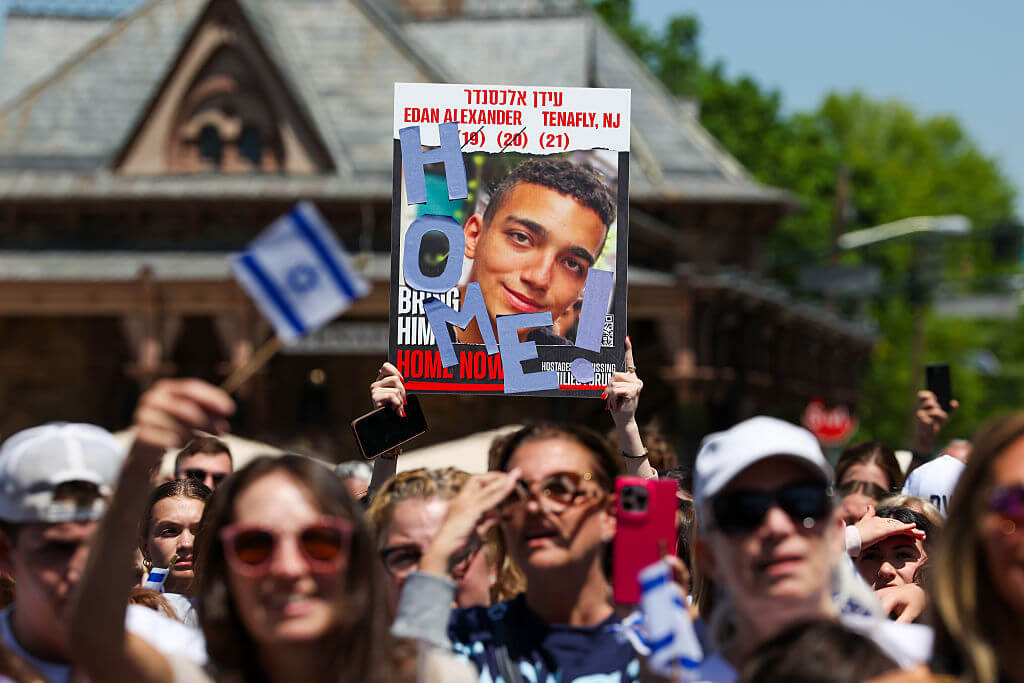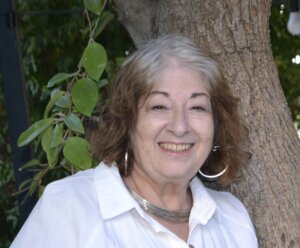What Talking to a Syrian Refugee Taught Me About Palestinian Anti-Normalization

Image by Getty Images
I met Shirin, a refugee from a village near Aleppo, Syria, while I was on assignment in Berlin. Her husband was killed in the fighting; over a year ago, together with her two teenage daughters, she fled to Turkey, then across the sea to Greece, then trekked across Europe to shelter in Berlin.
Shirin is not her real name; she still has relatives back in Syria, and is afraid they would come to harm if anyone were to know she is sheltering in Berlin — or speaking with a Jew.
Even in donated clothes, Shirin, 52, is graceful and elegant. In Aleppo, she was an English teacher; in Berlin, she is living in a dormitory-like shelter, with little to do. The Jews volunteering in the shelter are the first she has ever met.
Her English is fluent. Determined, she says she doesn’t want to talk about the war, her husband, politics or the painful trek to Berlin; instead, she talks about her concern for her daughters’ future. We chat easily — until one of the volunteers, an Israeli living in Berlin, interrupts us briefly to coordinate our schedules.
Shirin pushes her chair back a bit.
“You were speaking in Hebrew? You are Israeli?” she asks me.
I respond, “I was and I am.”
She turns away from me, and, still speaking in English, talks to herself. “The [Syrian] governments taught us to hate Jews. I met Jews here, and they are kind. They taught us to hate Israelis — but this lady [referring to me] is OK, a bit like me and has children like me…and she’s Israeli. The government that brought this war on us, they killed my husband. Because of them, I am a refugee. I won’t believe anything that any government tells me anymore…”
Then she turns back to me and continues talking about her daughter.
That conversation with Shirin continues to echo through my political, social and psychological contexts. I think about how infrequently we truly meet with the infamous “other” who lives on the other side of our conflicts. Closest to the home: How many Palestinians ever really chat with Jews? How many Jews, Israeli or North American, ever really meet with Palestinians?
That’s why I want the Palestinians to end their policy of non-normalization with Israel — and I want the North American Jewish community to invite Palestinians to speak.
According to the Palestinian Campaign for Academic and Cultural Boycott of Israel, normalization is “the participation in any project, initiative or activity…that aims to bring together Palestinians and Israelis without placing as its goals resistance and exposure of the Israeli occupation and oppression against the Palestinian people.” A deeper reading reveals that non-normalization is a demand that any meeting be predicated on a renunciation of Zionism and acknowledgement of the illegitimacy of the State of Israel.
That, of course, I cannot and will not do. Yet I can understand at least some of the reasons that Palestinians present for non-normalization. Meetings, even seemingly innocuous ones, can be interpreted as drawing a false equivalence, as though Israelis and Palestinians can ever meet as equals as long as the occupation continues. Dialogues can feed a sense of complacency, easing the urgency for Palestinian independence and sovereignty, and they can be abused by Israelis and Jews to salve their troubled consciences.
I also understand why Jews, in North America and in Israel, don’t want to provide podiums for “the enemy” at a time when even critical pro-Israel positions have become untenable on college campuses, the Black Lives Matter movement condemns purported “Israeli genocide,” and Israelis are ostracized abroad.
And it’s true that all the coexistence initiatives — from semi-official and Track II meetings to children’s choirs and women’s cooking groups — have not created a reliable peace process; if anything, both sides have become more intransigent.
But it’s precisely because there are currently no effective peace negotiations or credible leadership efforts on either side that civil society must move in. When we don’t meet, hatred and mistrust between our societies and within our societies grow stronger and more virulent. The seemingly unbreakable cycles of violence undermine the constituencies that we need to create a two-state (or any state) solution.
Meetings by themselves will not bring peace. The so-called “contact hypothesis,” developed by social scientists back in the 1950s, has long been replaced with scientific evidence that proves “contact is not enough.” Kumbaya campfires aren’t a replacement for foreign policy; semi-official and Track II dialogues won’t lead to permanent agreements, and sweet children’s groups will not put an end to the occupation or to terror.
But without meetings we are left with only our simplistic, zero-sum perceptions of the other. When we meet, we do not give up our own position or demand that they give up theirs. But we can come to understand that they believe in their narrative just as deeply as we believe in ours, that their national memory and collective identities are as crucial to them as ours are to us, and that their hopes for their children’s futures are much like our own.
My conversation with Shirin taught me more: Meeting with the other is always a meeting with our own self, our own fears and hatreds. Listening forces us to change the calculus of victim and perpetrator and, viewing ourselves differently, to think of new solutions.
Just as Shirin’s meeting with Jews and Israelis is part of her political revaluation, meetings between Palestinians and Israelis can inoculate us against the hate that surrounds us. They can inure us to the fear-mongering that our cowardly leaderships use instead of leading us to peace. And that can have a very real political impact.
Eetta Prince-Gibson, the former editor in chief of The Jerusalem Report, is an award-winning journalist who lives in Jerusalem.
The Forward is free to read, but it isn’t free to produce

I hope you appreciated this article. Before you go, I’d like to ask you to please support the Forward.
Now more than ever, American Jews need independent news they can trust, with reporting driven by truth, not ideology. We serve you, not any ideological agenda.
At a time when other newsrooms are closing or cutting back, the Forward has removed its paywall and invested additional resources to report on the ground from Israel and around the U.S. on the impact of the war, rising antisemitism and polarized discourse.
This is a great time to support independent Jewish journalism you rely on. Make a gift today!
— Rachel Fishman Feddersen, Publisher and CEO
Support our mission to tell the Jewish story fully and fairly.
Most Popular
- 1

Fast Forward Ye debuts ‘Heil Hitler’ music video that includes a sample of a Hitler speech
- 2

Opinion It looks like Israel totally underestimated Trump
- 3

Fast Forward Student suspended for ‘F— the Jews’ video defends himself on antisemitic podcast
- 4

Culture Cardinals are Catholic, not Jewish — so why do they all wear yarmulkes?
In Case You Missed It
-

Culture Is Pope Leo Jewish? Ask his distant cousins — like me
-

Fast Forward ‘New Jersey tough’: Gov. Phil Murphy on released Hamas hostage Edan Alexander, a Tenafly native
-

Yiddish World How Yiddish found a home in Sweden (online lecture in Yiddish)
-

Fast Forward Hamas releases Edan Alexander, last living American hostage, to Red Cross
-
Shop the Forward Store
100% of profits support our journalism
Republish This Story
Please read before republishing
We’re happy to make this story available to republish for free, unless it originated with JTA, Haaretz or another publication (as indicated on the article) and as long as you follow our guidelines.
You must comply with the following:
- Credit the Forward
- Retain our pixel
- Preserve our canonical link in Google search
- Add a noindex tag in Google search
See our full guidelines for more information, and this guide for detail about canonical URLs.
To republish, copy the HTML by clicking on the yellow button to the right; it includes our tracking pixel, all paragraph styles and hyperlinks, the author byline and credit to the Forward. It does not include images; to avoid copyright violations, you must add them manually, following our guidelines. Please email us at [email protected], subject line “republish,” with any questions or to let us know what stories you’re picking up.















